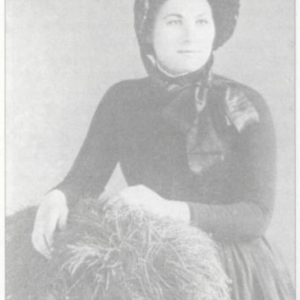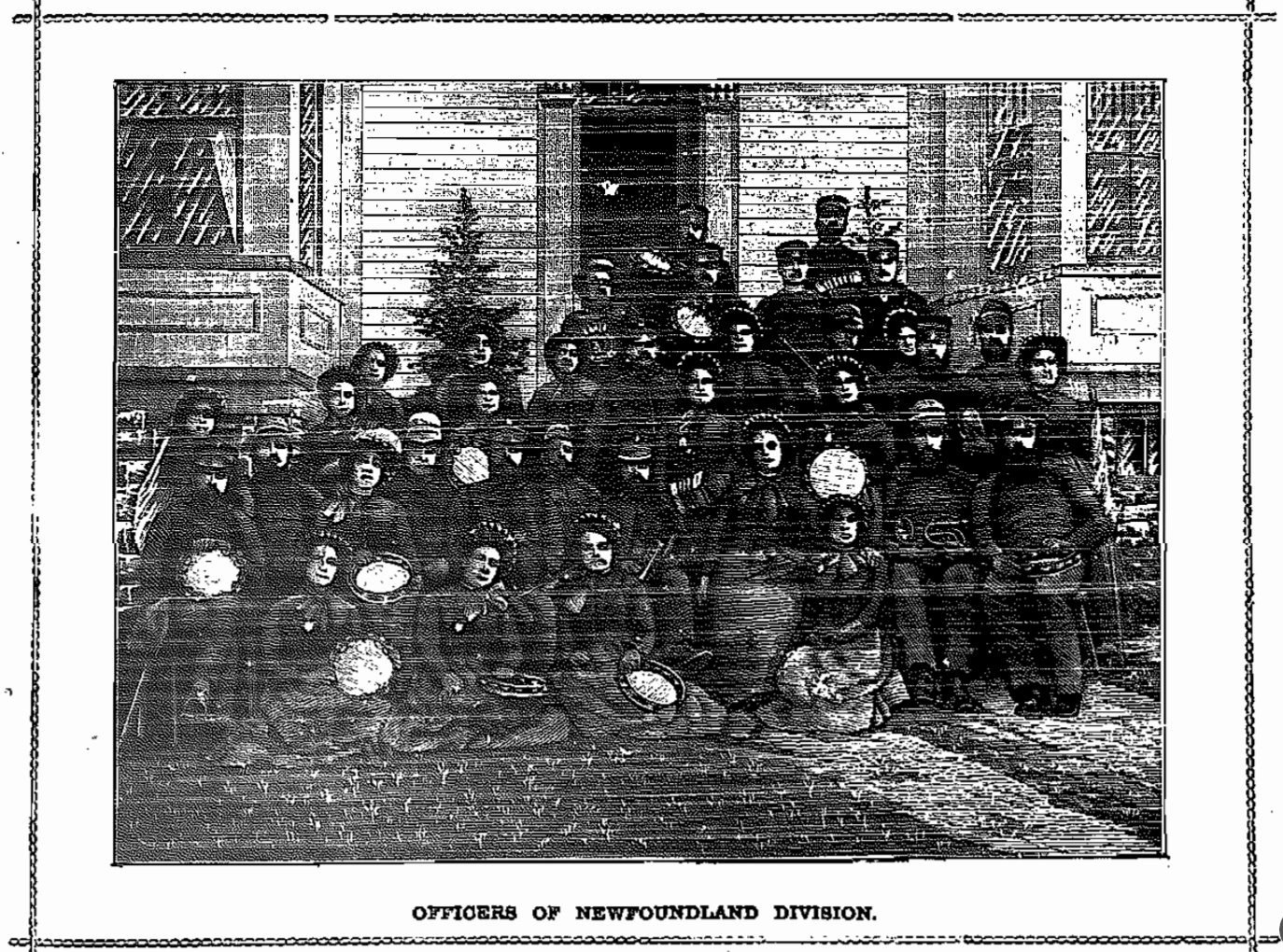 The Salvation Army landed in Newfoundland in 1886. I don’t know when exactly they can be placed in Little Bay but by 1888 they had a small, active presence in the town. I suspect this was organized around the Rideout family.
The Salvation Army landed in Newfoundland in 1886. I don’t know when exactly they can be placed in Little Bay but by 1888 they had a small, active presence in the town. I suspect this was organized around the Rideout family.
Lieutenant Lizzie Penny stepped off a steamer in Little Bay on January 10th that year. She was in the company of Cadet Lizzie Howse. The pair moved into the Rideout’s home and Mrs. Rideout took on aide duties. They first hold services there.
Using their arrival and departure dates against the publication dates for The War Cry we can deduce that information in The War Cry from Little Bay is delayed by roughly two months. Subtracting those two months will allow us to line The War Cry up with reporting found on those same events in the Twillingate Sun. This should set us up with a nice contrast.
Media coverage from the Twillingate Sun begins almost immediately upon their arrival and is blatantly hostile in tone. Their services are described as “noisy and sacrilegious” and a “resort for the trifling and rowdies”. Their gender is repeatedly emphasized with the pair referred to as “the two girls” or the “female salvationists”. This appears to function as a way to explain away any public success.
In The War Cry on April 21st she claims over 50 converts since their arrival. If I’m right this is referring to a date in February. Contrasting with the Twillingate Sun coverage at that time we find confirmation that early services drew crowds which are therein credited to the public’s amusement at the “novelty of the eccentricities” being performed. People are said to be in a “rush to see two girls with peculiar dress and musical instruments”. Reporting in both January and February recognized the size of these gatherings but claimed it was already fading away as people lost interest. This should be read suspiciously because if true in January it couldn’t also be the case again in February.
In contrast to how varied denominations were otherwise addressed in town, here was an obvious effort to suppress a religion. They were unable to secure a space for worship at all. They were not allowed to rent any hall or school house. As such they were forced to hold services outside and some distance from town. Mr. Burgess would take the young officers there by way of sleigh. Worshippers considered particularly wild in “singing and throwing their arms about” were reportedly “well snow-balled” on their way back into town which calls attention to an ugly practice in itself but further suggests that their services were being monitored as that’s the only way this sort of targeting could have occurred.
March was an interesting month. There was an incident on the 12th during an Orangemen’s meeting at Little Bay Islands. The Twillingate Sun reported that a Salvationist arrived wearing his uniform and insignia to which members of the Lodge objected. He covered it in a jacket to appease them but during prayer his yelling of “glory” and “hallelujah” wasn’t abided. The next immediate paragraph covers a Methodist school Board meeting on the 21st in which it was decided that the Salvation Army would be denied their request to hold meetings in the Methodist school.
There is a letter to the editor on the 17th which claims that the Salvation Army “have encountered but little interruption compared with the many annoyances they have met with elsewhere”. Which, if true, is frankly terrifying. The author, seemingly, in defence of the Salvation Army, speaks favourably of their efforts and shuns those who would judge them. The writer requests that those who disagree with them should just keep themselves away. This request to stop harassment is backed by an ideology rather unique to Little Bay. The letter claims that all denominations present serve the same purpose which, I feel, really harks back to Rev. Gunn and The Baron’s early efforts to keep the town multi-denominational. This may suggest the author was present in the early days of the town. The piece is signed Videtur which is Latin. The use of Latin hints at someone of rank. My main suspect is the doctor. However, it is curious that they would feel the need to hide their identity.
The War Cry reports in September that the town was visited by the Salvation Army Adjutant. Subtracting two months and checking the Twillingate Sun for July we find him identified as “Glory Tom”. In an issue of The Crest we find a first hand account from a woman named Elizabeth Shepherd which reads “One night we heard about the revival ‘up harbor’ in The Salvation Army. My girl friend and I both decided to go to one of the cottage meetings. When we were nearing the house we heard the singing and prayers. The big kitchen was crowded and leading the meeting was a visitor from St. John’s. Glory Tom Calhoun. He had a big smile and bushy hair. I asked one of the men to lift me up so as to be able to see the people kneeling at the chairs”.
The Twillingate Sun’s coverage highlighted a lack of converts at this event and claimed the Salvation Army was too unpopular to rent any place for their services. The resulting outdoor services were said to “continue to disturb the quiet town”. The War Cry confirms that there were three or four of these outdoor services a week during this time. It also confirms that total Salvation Army numbers were smaller. This is said to be due people leaving for the summer. Lieutenant Lizzie Penny took a summer trip herself when she left to attend St. John’s council. When she returned she held the rank of Captain.
 Captain Penny started to make some headway. She refers to a battle with the enemy which was won. Published in October I place it in August and in August we find that the Mining Company appears to have had made some allowances. The Salvation Army officers’ quarters at Loading Wharf were built. Cadet Howse left town that month. Captain Penny would follow suit around October. Little Bay’s Salvation Army continued and they were replace by other officers. The new arrivals no longer having to stay with friends. Services continued to be held either outside or in the homes of Josiah Clarke and Thomas Rice. They did not receive a barracks until 1890 when, according to Ohman, they had built one on the bay itself. I don’t know if it was accessed by boat or bridge but I’d sure love to find a picture of it. Its stove was fixed with the insignia in such a way that it showed in red when heated. They also had their own band which was publicly recognized. Among their instruments were two dog skin drums. The tone of reporting on them softened after this. People really liked the band. I don’t know if their barracks survived the fires but I’d guess not. There is some oral history of a location not balanced on the bay so I’d imagine they rebuilt. The Little Bay mission officially closed in 1912 and by 1930 the town was unofficered. Any remaining members likely went to services in Springdale after that.
Captain Penny started to make some headway. She refers to a battle with the enemy which was won. Published in October I place it in August and in August we find that the Mining Company appears to have had made some allowances. The Salvation Army officers’ quarters at Loading Wharf were built. Cadet Howse left town that month. Captain Penny would follow suit around October. Little Bay’s Salvation Army continued and they were replace by other officers. The new arrivals no longer having to stay with friends. Services continued to be held either outside or in the homes of Josiah Clarke and Thomas Rice. They did not receive a barracks until 1890 when, according to Ohman, they had built one on the bay itself. I don’t know if it was accessed by boat or bridge but I’d sure love to find a picture of it. Its stove was fixed with the insignia in such a way that it showed in red when heated. They also had their own band which was publicly recognized. Among their instruments were two dog skin drums. The tone of reporting on them softened after this. People really liked the band. I don’t know if their barracks survived the fires but I’d guess not. There is some oral history of a location not balanced on the bay so I’d imagine they rebuilt. The Little Bay mission officially closed in 1912 and by 1930 the town was unofficered. Any remaining members likely went to services in Springdale after that.
As for Captain Lizzie Penny herself she went from Little Bay to Grand Bank for awhile before taking charge of operations in Twillingate. Her big claim to fame would come in 1893 when she was one of the first Newfoundland Salvation Army officers to be sent to Canada in a group that would become known as “the renowned seven”.
That’s it, folks. Thanks for reading! I’ll send you off with some insight into the population numbers for the Salvation Army in Little Bay.
We know, from census data, that the total number of people in Little Bay identifying as Salvation Army was 79 by 1891. I’d put the number close to that when Captain Penny departed. She deserves the recognition for that. While I don’t know what the number was prior to her arrival I know it was small. Lizzie Penny reported on the numbers of Little Bay converts in The War Cry during the duration of her stay. Assuming I didn’t miss any (The War Cry didn’t have a keyword search function) the numbers are listed below.
- 1888, February: 50+
- 1888, July: 2
- 1888, August: 2
- 1888, October: 1
- 1888, November: 2
Sources:
- 1888, Jan 10 – Lt. Penny arrives in Little Bay to a small but active group (WC, April 21)
- 1888, Jan 14 – Arrival reported (TS)
- 1888, Jan 21 – “Nightly noisy meetings” “place of resort for the trifling and rowdies” “novelty of the eccentricities having ceased to amuse” “now the meetings are only attended by a few restless souls who have drifted away like refuse from their spiritual builders and will soon separate from one another, for already, there seems to be a division among them” “two female salvationists arrived” (TS)
- 1888, Feb 18 – Lt. Penny and Cadet House first live with Alfred Rideout. Mrs. Rideout became her aid. Next they move in with Thomas Rice. They held services there and at Mr.J. Clarke’s. They were forced to hold services outside of town. Mr. Burgess took them by sleigh. Worshipers were pelted with snowballs as they returned on Feb 12th. Services described as ‘noisy and sacrilegious’ (TS)
- 1888, March 17 – Videdue letter praising Army (TS)
- 1888, March 31 – Orangemen meeting at Little Bay Island on the 12th. Salvationist wore jacket with inscription causing members of the Lodge to object. He covered it with a jacket but yelled during prayer. Later decided that Salvation Army could not use Methodist school house (TS)
- 1888, April 21 – Story of man carrying wife away. Worshipping in houses +50 since Jan 10th (WC)
- 1888, June 16 – “have not yet procured any place suitable for barracks” no converts. story of man without bible at work. Lt. Penny (WC)
- 1888, July 21 – Glory Tom visited. “have made no recent converts. They are so unpopular that they cannot rent or loan any school house or hall” “their outdoor meetings continue to disturb the quiet town” (TS)
- 1888, Aug 4 – Construction underway at Loading Wharf for Salvation Army officers (TS)
- 1888, Aug 11 – After three days travel Captain Penny returned from St. John’s council. Open air three or four nights a week but numbers small due to people leaving for the summer (WC)
- 1888, Sept, 8 – The Adjutant visited Little Bay. Host away. Two weeks. New officers quarters +2 (WC)
- 1888, Sept 29 – Salvation Army barracks being built in Twillingate (TS)
- 1888, Oct 20 – Battle with the enemy. Departure of Cadet. +2 (WC)
- 1889, Dec 8 – +1 (WC)
- 1889, Jan 12 – Captain Penny departs Little Bay. 12 months noted as 10. +2 (WC)
- 1889, Jan 19 – Picture. Adjutant’s visit (WC)
- 1889, Jan 19 – “Two female Salvation Army officers are now in Little Bay. Meetings are still held in Mr. Josiah Clarke’s and Mr. Thomas Rice’s house, as no barracks or house has yet been secured” (TS)
- 1889, Feb and later – Penny at Grand Bank and Canada (Moyles)
- 1891 – 79 members of the Salvation Army (Census)
- Elizabeth Sheppard quote. (The Crest Vol. 14. No. 3) The date given is Jan 1886 so it may refer to a different meeting, however, the Adjutant’s presence makes me place it in ’88.
- Images come from Moyles’ History of the Salvation Army (Lizzie Penny pic) and The War Cry Jan 19 1889 (Officers pic)
- Post 1889 Little Bay references to the Barracks come from Jessie Ohman’s visit, Twillingate Sun Feb 1889, and NL Quarterly)
